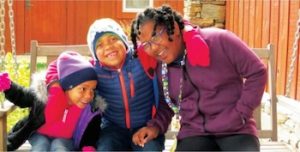Kim Kelly attended a special needs overnight camp for the first time at age 6. Before then her mom wanted to keep her close because Kim has hearing loss and orthopedic limitations. “My daughter needed to learn to do things on her own,” says Ruth, “and I needed to let go a little.”

There are many benefits to kids who attend summer camp, but for kids with special needs, those benefits are amplified, says Sandy Cameron, former editor of Camping Magazine. “Traditional camps do a great job mainstreaming children with special needs into their programs, but a special needs camp lets them be with other kids who have similar disabilities.”
Heidi Haldeen, summer program specialist for Easter Seals, agrees. “At a special needs camp, kids have the same opportunities they have at traditional camps. The only difference is the activities better accommodate the campers’ needs. This gives them a chance to shine.”
That was the experience of 9-year-old Tiffany Wells when she attended a special needs camp. Tiffany, who has Cerebral Palsy and asthma, plays on a softball team and participates in a bowling league during the school year. But because none of the children she plays with have special needs, the competition isn’t equal.
“Attending a special needs camp allowed Tiffany to compete on more even ground because all the other kids were playing with some kind of disability,” says her mother Linda. The result? “Tiffany saw that she could actually win and come out on top.”
One of the beauties of a special needs camp is that kids learn, play and live with others who have similar needs and disabilities, says Cameron. “It gives them the confidence to try new things they might not have otherwise tried.”
When Kim first went to camp, she was afraid of the water. “She cried just getting her face wet,” says Ruth. Through the encouragement of trained staff, Kim slowly edged her way into the water. “By summer’s end, she was jumping in the deep end and received her first American Red Cross swimming certificate.”
While some consider summer camp an outlet for fun and recreation, others use it to continue education, reach therapy goals, and teach life skills. This is accomplished one-step at a time. “It may mean being 10 minutes late for breakfast so [a child] can learn to tie his shoes,” says Haldeen.
Kids learn about friendships, too. When Tiffany went to camp, there was a girl in her cabin with a more severe case of Cerebral Palsy than Tiffany had. Because Tiffany had spent her whole life being helped, she naturally jumped at the chance to help someone else. “When we went to the dance, I got to push my new friend around in her chair,” says Tiffany. “I also got to help her eat.”
“One of the best things to be said about camp – any camp – is the opportunity for the children to make friends,” says Cameron. “And for children with special needs, it’s especially important. They find out they are not alone.
When camp ends, kids have fond memories of taking a break from their normal routine. Many campers look forward to returning year after year, says Haldeen. “For many, we are their summer vacation. The minute they drive away, they are making plans to return next year.”
Denise Yearian is the former editor of two parenting magazines and the mother of three children.
Good news!
There is a plethora of inclusion and special needs camps in San Diego.

Check out our complete list of camps at www.specialneedsresourcefoundationofsandiego.com/special-needs-resource-list-san-diego/camps-and-enrichment-programs.
Whether you’re looking for inclusion camps or camps specifically designed for children with special needs, there are questions to ask camp staff to help determine what’s most beneficial for your child. See a list of questions to ask at www.specialneedsresourcefoundationofsandiego.com/inclusion-camps-questions-to-ask.
Leave a Reply